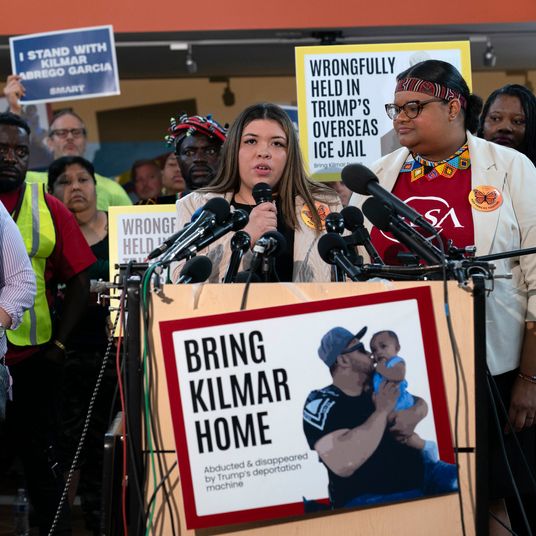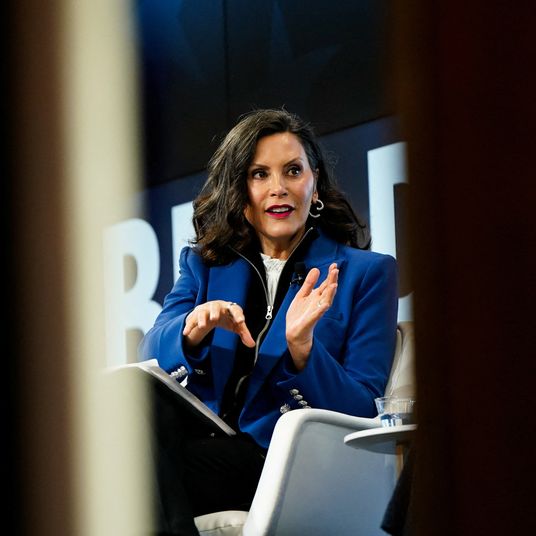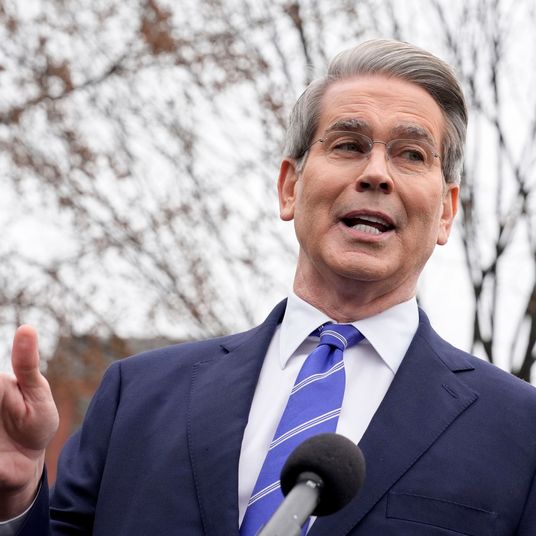
Saxon Ratliff, the protein-shake–blending, muscle-bound bro at the center of the latest season of The White Lotus, is the man of our moment. Played with impish glee by Patrick Schwarzenegger, Saxon is the sort of young male we’re supposed to care a lot about these days: scornful of political correctness, indifferent to what is happening outside his privileged bubble, definitely voted for Trump. If we could only figure out what makes Saxon tick, if we could only light up some part of his lizard brain that would compel him not to vote for Trump, then maybe everything would be all right. Discovering what Saxon and other young men want has become a veritable holy quest for the liberal press and political class, the skeleton key to saving the Republic. Unfortunately, Saxon’s interests are limited to getting laid, pumping iron, and going to Duke.
Or so it seems. It often feels like the show’s creator, Mike White, is spinning his wheels in this third season, cycling through familiar critiques of the empty materialism of his wealthy and out-of-touch characters, who search for solace and meaning in all the wrong places: sex, money, lorazepam. Nevertheless, through the travails of Saxon, the show has struck upon some devastating psychological territory that shimmers just beneath the discussion of young men and their desires, most notably in a now-notorious scene in which a drug-addled Saxon gets a hand job from his little brother Lochlan during a threesome. This scene has largely been interpreted as the latest example of HBO shocking viewers with depictions of incest — a decadent society’s last sexual taboo — a trick the network has played going back to the first episode of Game of Thrones. But Saxon’s crisis is more significant than that, a glimpse of a larger conundrum for heterosexual males who, in this anti-woke era, are less beholden to women than ever.
While Saxon hits on any woman in sight, women are just interchangeable ciphers in a campaign of sexual conquest — picking up chicks, Saxon tells Lochlan, is “a numbers game.” In fact, the person he is really trying to impress is Lochlan, a sensitive boy who is caught in a tug of war between Saxon and their soul-searching sister, Piper, who has come to Thailand to join a Buddhist seminary and escape the suffocating confines of her shallow family. In Saxon’s universe, only men are truly worth wooing — male attention, male recognition, is the prize. The need for such validation naturally extends to his father, Timothy, a smug businessman in serious legal trouble who is Saxon’s whole world. “I’ll always be seen by everyone as Timothy Ratliff’s son, and I’m okay with that, I am, as long as everything at work is going good,” Saxon tells him. Women, in contrast, are the dark side, where manly fulfillment withers and dies.
The idea that women are an obstacle or a distraction is a hallmark of the so-called manosphere, which differs from the male-exclusive arenas of yore, such as the booze-soaked frat house or the smoky video-game den, in its emphasis on being physically fit and mentally sharp — on becoming your best self. (As Saxon states at one point, he doesn’t take drugs, he is the drug.) The most viral video of 2025 so far involves an extremely jacked wellness influencer named Ashton Hall whose meticulous morning routine includes dipping his face in bowls of ice-cold bottled water and rubbing his cheeks with a banana peel. It is patently, purposefully absurd (the better to tweak the algorithm in its favor) yet also mesmerizing in its heavily ASMR-ed glory. There are many similar videos of chiseled men with torsos as sleek as dolphin skin attending to every facet of their appearance in barely furnished modern apartments. They are cultivating their inner lives as well, meditating in dimly lit rooms and using those beefy arms to jot down their thoughts in journals. All of this seems to be performed for consumption by other men. In a follow-up video, Hall encounters a group of male fans who are stoked to meet him in person and take selfies with him. (“That’s crazy; thank you, bro!”) The only woman we see is a faceless assistant who hands him his slippers and prepares eggs and bacon for him.
The absence of women is an explicit part of the pitch for the Bali Time Chamber, a White Lotus–esque resort exclusively for men in a “hidden” hilltop location where they can improve themselves and fulfill their potential. If you are a male of a certain age, it is likely that you have been served social-media ads for the resort that proclaim “No junk food, no women, no parties, and no alcohol” over images of shirtless men gnawing Flinstones-size steaks, sparring with each other, dashing up steep inclines, and typing intently on their laptops. “Hundreds of successful businessmen, top-tier athletes, and self-development enthusiasts have already joined the community and completely changed their lives,” the ad says.
It would be easy to mock these erotically charged videos as ways for straight guys to partake in the pleasures of gay camaraderie without acknowledging the sexual undercurrents — like a Troye Sivan–ian utopia of male flesh except the participants are sucking bone marrow and spending an exorbitant amount of time lacing up their gym shoes. Surely that is a part of it. But there is also a sense that these are safe spaces for heterosexual men to preen and “optimize” and indulge without judgment from women, those harridans who make men feel bad about themselves for being men.
In a broadly sympathetic profile in The New Yorker of the bro podcasters who dominate the manosphere, young men are presented as being forced by censorious liberals and hectoring feminists into the sculpted arms of Joe Rogan and Hasan Piker. Here, they can finally be among like-minded people — “the contemporary don’t-tread-on-me type who demands both the freedom to have gay friends and the freedom to use ‘gay’ as an insult,” writes Andrew Marantz, as well as the resurrected epithets “retarded” and “pussy.” Or as Piker half-jokingly says, “We’re just here to have fun. And also reach out to the young men out there who are lost — who feel anchorless, rudderless — by lifting some heavy weights.” A producer for Piker’s show, which is politically on the left, says the audience is 60 percent men, on the low side for such fare; the demographic tilt is usually 80 or 85 percent male.
The new predominantly male space is nowhere more evident than in Trump’s Washington, where his administration is dismantling DEI programs that have allegedly recruited and promoted inferior women (among other historically oppressed people) at the cost of government aptitude and military lethality. The instantly infamous Signal group chat is a window into an executive branch proudly leeched of womanly influence, with the exception of an unidentified female intelligence officer, the practically silent DNI head Tulsi Gabbard, and chief of staff Susie Wiles, who cheers from the sidelines like a soccer mom as the boys bomb Yemen. Mostly, it’s all men all the time, trading fist-bump and fire emoji, talking shit about those “PATHETIC” European freeloaders, and disagreeing with each other in a cagey “my good sir” tone.
I don’t mean to suggest the American war machine would be any less destructive if a few more women had been included in the “Houthi PC small group.” Nor am I trying to censor what young men think or say — as a child of the 1990s, I can assure you that my pals and I used the P-word and the R-word and the G-word (pejorative) more times than Hasan Piker’s posse ever has, and we did it way before those words accrued the rather ridiculous transgressive power they have today. But later we stopped using those words, not because we were forced to by our liberal overlords in the media and the university, or even merely because of shifting cultural norms, but because we grew up. And I would posit that a crucial component of that process was opening ourselves up to women — to their criticisms, their eye-rolling, their pity for our benighted, immature souls. It is so obvious that it shouldn’t bear stating, but maybe these days it does: Self-discovery won’t come from doing handstands on a barbell or masking your mouth with hostage tape before bedtime or receiving constant affirmation of your dumbest prejudices from your favorite parasocial podcasters, but from submitting your intimate self to the terrifying scrutiny of someone other — who, for straight men anyway, is more likely than not going to be a woman.
That a woman’s perspective might be salutary dawns on Saxon only later in the show, when he develops a crush on a fellow guest, the bright-eyed Chelsea, who sees through him, predicting that in 30 years he will be another rich old man descending on Thailand to hunt for lissome young females. But The White Lotus suggests that this is not the true logical end point for those who live in the manosphere and abide by its diminishment of women, an ethos that brings the contemporary heterosexual man to some pretty interesting existential places. During the fateful threesome, the woman involved with the two brothers is a blur, as hazy as a long-forgotten memory. What is clear is the hand working at Saxon’s crotch and the confused expression on his face — the moment when all this virtual jerking off becomes literal and the dream indistinguishable from the nightmare.






























